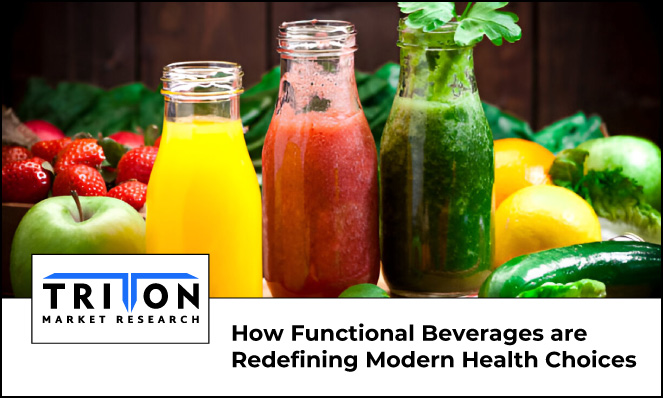



26, August 2024

Functional beverage - a non-alcoholic drink that provides health benefits beyond basic nutritional content. These beverages are designed to offer specific health advantages, which can include improved immune function, enhanced digestion, or increased energy levels. According to an article on News Medical, functional beverages contain bioactive ingredients like phenolic compounds, vitamins, minerals, amino acids, unsaturated fatty acids, and peptides from probiotic microbes, plants, or animals.
Additionally, these ingredients may help reduce cancer rates, prevent cardiovascular disease and diabetes, and offer antioxidant and anti-inflammatory benefits. Additionally, they support gut health, immune function, and cognitive well-being.
The global beverage industry has undergone significant transformation, adapting to shifting consumer preferences and a growing focus on health. Leading this change are functional beverages, which offer benefits beyond basic nutrition. The rise of wellness and self-care trends has driven the popularity of drinks like herbal teas, fortified juices, and probiotics. Health-conscious consumers are increasingly drawn to beverages that contribute positively to their health, as seen in the growing preference for functional drinks that offer additional benefits, such as vitamins, minerals, and probiotics. This shift underscores the beverage industry's trend toward catering to wellness-focused products.
Beverages play a vital role in daily life, providing hydration and enriching social interactions while also contributing to overall well-being. Many beverages carry cultural significance, often rooted in traditional practices and rituals. For example, Turkish coffee and Japanese matcha embody hospitality and cultural heritage. The exploration of functional beverages reveals a blend of culture, health, and modern consumer trends.
The exploration of functional beverages reveals their deep-rooted significance in both health and cultural contexts, highlighting a shift in consumer preferences that transcends mere hydration to encompass wellness and social connection. This trend underscores the importance of beverages in daily life, emphasizing the evolving landscape of the beverage industry. This trend underscores the evolving landscape of the beverage industry, where beverages not only quench thirst but also foster connections and reflect societal values.
Shifting demographics, particularly among millennials and Gen Z, are significantly influencing beverage preferences. Millennials show a strong preference for health-conscious choices and innovative products that enhance cognitive performance and overall wellness. They gravitate towards convenient beverages that fit their busy lifestyles while offering health benefits. In contrast, Gen Z prefers nonalcoholic options and functional drinks, such as craft sodas, specialty teas, and mocktails infused with adaptogens.
Health-focused consumers across both demographics prioritize ingredients that support wellness goals like beauty, immune health, and digestive balance. As a result, the demand for functional beverages that cater to these specific needs is growing, prompting manufacturers to innovate and diversify their product lines. This trend is particularly evident in the rising popularity of tea, kombucha, and coffee, each offering unique types, benefits, and cultural significance.
Culturally, tea signifies connection, hospitality, and daily rituals. In many societies, it is an essential part of social gatherings and traditional ceremonies, such as the Japanese tea ceremony and Chinese tea culture, where it embodies respect and tranquility. Tea is available in various forms, each providing distinct health benefits.
| Tea Types | Beneficial Properties |
| Green Tea | Rich in antioxidants, known for supporting heart health and boosting overall well-being. |
| Black Tea | Enhances alertness due to its caffeine content and may lower the risk of cardiovascular diseases. |
| White Tea | Known for its gentle properties, contributing positively to heart health as well. |
| Oolong Tea | Combines benefits from both green and black teas, offering a range of flavors and health advantages. |
| Herbal Tea | Herbal options like chamomile and ginger provide additional therapeutic effects, promoting relaxation and digestive health. |
| Matcha Tea | It is a finely ground powder of specially grown green tea leaves that holds a significant place in Japanese culture. Traditionally used in tea ceremonies, matcha is known for its vibrant green color and rich flavor. |
| Earl Tea | It is identified by its bold black tea base infused with bergamot essential oil. This tea is renowned for its refreshing flavor and distinct citrus aroma. Earl Grey tea benefits may include improved digestion and stress relief. |
| Darjeeling Tea | Often dubbed the champagne of teas, it is cultivated in the Darjeeling district of West Bengal, India. It is unique due to its growth at high altitudes and has distinct flavor profiles that can encompass floral, fruity, and muscatel notes. Benefits may include antioxidant properties and potential cardiovascular health support. |
Kombucha is a fermented beverage made from sweetened black or green tea, transformed through the action of a symbiotic culture of bacteria and yeast (SCOBY). It is known for its slightly effervescent nature and potential health benefits, such as supporting gut health and providing antioxidants, although many health claims require further scientific validation. Culturally, kombucha has roots in ancient China, where it was considered an elixir of life. It saw a resurgence in popularity in the West during the early 21st century as a health drink, often celebrated for its probiotic content. It is now enjoyed globally, with many flavors and varieties available to cater to different consumer preferences.
Coffee, cherished globally for its stimulating effects and rich flavors, comes in various forms, like espresso and specialty drinks. It may offer health benefits, including potential risk reduction for certain diseases. Culturally significant, coffee serves as a social catalyst, from Middle Eastern hospitality rituals to Western coffee shop gatherings, playing a pivotal role in social interactions worldwide. Let us explore some of these distinctive brews:
Ethiopian Coffee: Ethiopia, recognized as the birthplace of coffee, offers an incredible variety of flavors in its coffee offerings. Particularly from regions like Yirgacheffe and Sidamo, they are celebrated for their fruity and floral profiles, often resembling wine in taste. Ethiopian coffee culture is deeply rooted in daily life and social gatherings.
Brazilian Coffee: Brazil is one of the largest producers of coffee globally, primarily known for its Arabica beans. This coffee is characterized by its sweet, nutty flavors with chocolate undertones, making it suitable for various brewing methods, including espresso. Brazilian coffee culture is an integral part of the country's social fabric and economy.
The world of beverages seamlessly blends rich traditions with modern innovations, shaping today's beverage culture. From the historic cafes of Constantinople to contemporary coffee shops, these spaces have always been central to social interactions. They have evolved from social hubs into modern meeting places, reflecting the changing nature of society. The popularity of flavored teas, nitro coffee, and pour-over coffee methods highlights a growing demand for unique and personalized experiences. Meanwhile, the global rise of matcha and kombucha underscores a shift toward health-conscious choices and cultural exploration. Let's delve into the fascinating journey of these beverages and their impact on contemporary society.
Cafes: From Historic Hubs to Modern Meeting PlacesCafes and coffee houses first emerged as significant social hubs in the 15th century, starting in Constantinople. These venues played a crucial role in social evolution, serving not only as places to enjoy coffee but also as centers for public discourse and intellectual engagement. They were pivotal for political and artistic discussions during the Enlightenment. By the 17th century, cafes had spread across Europe, becoming cultural landmarks in cities like Paris, Vienna, and London, attracting notable figures from literature, philosophy, and the arts. Associated with bohemian culture, these cafes fostered lively conversations and community. Today, modern coffee shops continue this tradition, offering spaces for casual gatherings and remote work.
Modern brews: Flavored teas, Nitro Coffee, and Pour-OversThe beverage landscape has evolved with innovations like flavored teas, nitro coffee, and pour-over coffee, catering to consumers' desire for unique tastes and experiences. Flavored teas, enhanced with diverse ingredients, attract a broader audience. Nitro coffee, known for its creamy texture and smooth flavor due to nitrogen infusion, offers a less bitter alternative to traditional coffee. Pour-over coffee emphasizes craftsmanship, allowing enthusiasts to explore the distinct flavors of various beans and enjoy a more immersive coffee experience.
Matcha to Kombucha: Growing Inclusion Across CountriesThe global influence of beverages is evident in the rising popularity of matcha, including in Indian cafes, where it is embraced for its health benefits and vibrant green color. Originally rooted in Japanese culture, matcha appeals to health-conscious consumers worldwide due to its antioxidant properties and wellness benefits. Similarly, kombucha has surged in popularity in the US, prized for its probiotic content and its appeal to younger demographics seeking functional beverages. Its craft appeal has led to innovative flavors and marketing strategies. These trends reflect a broader shift toward health-oriented drinking habits and the integration of diverse cultural influences in local markets.
As sustainability and health awareness become increasingly important, there's a growing trend toward sustainable, functional beverages, particularly plant-based options like protein shakes, aloe vera water, and cactus water. These beverages appeal to consumers who prioritize wellness and seek to minimize their environmental impact.
The rise of plant-based functional beverages, such as those made with protein sources like peas, hemp, and brown rice, caters to health-conscious individuals, including those following vegan or vegetarian diets. Aloe vera water and cactus water are particularly favored for their natural, nutrient-rich hydration and wellness benefits. As environmental awareness grows, consumers are increasingly drawn to brands that practice ethical sourcing and sustainability, driving innovation in eco-friendly beverage options.
Customization is also transforming the functional beverage market as consumers seek personalized experiences. DIY beverage kits for smoothies, protein shakes, and herbal teas provide the flexibility to tailor drinks to individual health goals and preferences. Similarly, cafes are offering customizable options like plant-based milks, sweeteners, and functional ingredients to cater to diverse dietary needs. This trend towards personalization reflects the growing demand for health-conscious choices and fosters a sense of community around functional beverages.
Looking ahead, the future of functional beverages is set to evolve with shifting consumer preferences, increasing health awareness, and technological advancements. Sustainability remains a key focus, with a rising demand for plant-based options and innovative ingredients like adaptogens and probiotics. Overall, the functional beverage sector is expanding rapidly, driven by a combination of health, convenience, and sustainability, with brands that embrace transparency and innovation likely to thrive.

Prevalent cases of terrorist attacks in today’s world is increasing the need for severe standards of security for public safety, and the global market for biometric technology scrupulously accommoda..
Prevalent cases of terrorist attacks in today’s world is increasing the need for..